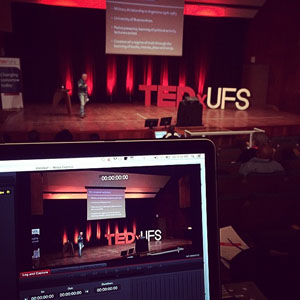 Photo: Evert Kleynhans, RooistoelTV |
Technology, Entertainment and Design (TED) fused into one conference at the first ever TEDxUFS event on Saturday 26 July 2014 on the Bloemfontein Campus. The TEDxUFS Chapter is not only a first for our university, but is also the first of its kind in the Free State.
TED consists of a global community of inspired thinkers, leading experts and curious knowledge seekers – engaging on topics across every discipline and culture. Ideas are communicated in the form of powerful talks of maximum 18 minutes each.
The TEDxUFS event followed the same concept as outlined by the governing body of TED. During this day-long conference, leading thinkers from various fields shared their brilliant ideas with like-minded executives and academics in our community. Speakers discussed topics that ranged from innovation to research and development in the fields of economics, entrepreneurship, technology, art, design, and even theology.
More information about the TEDxUFS Chapter is available on the TEDxUFS Facebook page.
Spotlight photo: aiesecmemorial.wordpress.com